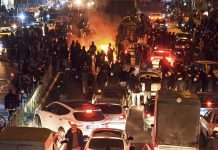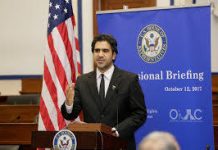May 19, 2015 Inquiry & Analysis Series Report No.1161
Iranian Attempt To Break The Saudi Sea Blockade On Yemen Could Lead To Violent Confrontation
By: A. Savyon and H. Verulkar*/MEMRI
Introduction
The Iranian ship Nejat (“Rescue”), which Iran says is bringing humanitarian aid, is set to arrive at the Yemeni port of Al-Hudaydah on May 21, 2015. Aboard it are Iranian representatives, including Majlis member Dr. Mohammed Sadeghi, who fought with Iran’s Islamic Revolutionary Guards Corps (IRGC) in Iraq during the 1980-88 Iran-Iraq war;[1] members of the Iranian media, and activists from France, Germany, and the U.S. Prior to the ship’s departure, the peace activists announced to the Iranian mediathat they were enthusiastic supporters of the regime of Iran’s Islamic Revolution, and that they were willing to die in their mission to bring humanitarian aid to Yemen.[2]
Pentagon spokesman Col. Steve Warren said that the Nejat was joined by two Iranian warships last night.
Yemen’s sea and air ports have been under siege since the beginning of Operation Decisive Storm.
The Saudi Position On The Iranian Vessel’s Attempt To Enter Yemen
The Saudis are allowing humanitarian aid into Yemen only after inspection to ascertain that weapons are not being smuggled in to the Houthis.
Brig.-Gen. Ahmad Al-‘Asiri, spokesman for the Arab coalition’s Operation Renewal of Hope and Saudi defense adviser, told Al-Jazeera by phone on May 11: “The coalition forces have the right to conduct a search” of the vessel. He added: “After we ascertain that its cargo [indeed comprises humanitarian aid] we will allow it toproceed to its destination.”[3]
In a May 12 statement, Al-‘Asiri stressed, “The Arab coalition will not allow any vessel to reach Yemen without coordinating with us,” and clarified: “The Saudi land forces are on alert to deal with any attack.” He said that the coalition was issuing permits to bring in aid to Yemen in coordination with the U.N., and that Iran can send its aid to Yemen via the U.N.[4] Under this arrangement, the Saudis have allowed several aid ships that passed inspection to enter the port.[5]
On May 13, Al-‘Asiri said: “Another country [i.e. Iran] seeks [to bring in] aid [to Yemen]by force, in violation of the decision by the Yemeni government and the Arab coalition that the Yemeni government has authorized the latter to deter all violations. This constitutes a violation of international law.”[6] In another conversation with Al-Jazeera, on May 14, Al-‘Asiri warned Iran against any attempt to bring in aid by force, saying that “any attempt by any country” to do so “will be considered a precedent in this kind of crisisand under international law.”[7]
Also, Yemeni Foreign Minister Riyadh Yassin implied in a May 13 phone conversation with Al-Jazeera that all means would be used against the Iranian vessel should it try to break the blockade. He placed all responsibility for any violation of the blockade on the Iranian regime, andadded that Yemen had authorized the coalition to deter any violation.[8]
Also on May 13, Yassin told the London-based Saudi daily Al-Sharq Al-Awsat that Yemen’s Foreign Ministry had given no permission to the Iranian ship to proceed to Al-Hudaydah port. He explained that the coalition countries had set up sites for inspecting aid shipments via sea and air before they could enter Yemen. Ships must first go to Djibouti for inspection, and aircraft are searched at airports in some of the coalition countries.
He said: “Yemen’s Foreign Ministry, which is operating temporarily from Riyadh, has granted many entry permits to theaid and humanitarian organizations [whose delegations] arrived recently at Sana’a airport after contacting the ministry…
“The Iranian vessel’s advance towards Yemen, which is not authorized by the Yemeni government or the coalition countries,” he said, “constitutes a clear provocation to the international community.” He added: “We must know the identity of the passengers on the ship, what their roles are, and whether or not they are going to go back [to their countries]… On board this ship, there are 60 Iranians and seven foreigners from human rights organizations, and they do not have visas to enter Yemen. Therefore, their entry is illegal, and they must be held fully responsible for this.”[9]
On May 16, 2015, Yassin told Al-Sharq Al-Awsat that another Iranian ship had turned back to Bandar Abbas, in southern Iran, after the UN demanded that Tehran allow its cargo to be inspected. He said: “The ship’s return [to Iran]… indicates that it had contraband on board.”[10]
He also underlined an April 28, 2015 incident in which a civilian Iranian plane from Oman attempted to land at Sana’a airport without authorization,[11] which ended with the runway being bombed by Arab coalition jets. Noting that while all the countries and aid organizations obey laws without causing provocation,”Tehran’s insistence on violating Yemeni airspace, and its attempt to land at Sana’a airport, led to the destruction of [the airport’s] runway, out of fear that [Iran] would [use it] to carry out their plans. The same will apply for Iran’s declaration that it will not allow inspection of the vessel that it is claiming carries humanitarian aid.”[12]
Additionally, the Yemeni mission to the UN sent a letter to the Security Council warning that if Iran does not allow inspection, it will bear full responsibility for any incident resulting from the vessel’s attempt to enter Yemen’s territorial waters.[13]
Iran’s Position On The Vessel’s Attempt To Break The Blockade
Iran, which supports the Houthis and has already sent them weapons,[14] does not recognize the Saudis’ authority to enforce the blockade, particularly their authority to stop humanitarian aid from entering. It argues that the ship’s entry into Yemen has already beencoordinated with the UN.
On May 16, 2015, Iranian Deputy Foreign Minister Hossein Amir-Abdollahian said: “Saudi Arabia cannot make decisions for the countries aiding Yemen or forthe UN.”[15]
In a May 19 Al-Manar TV interview, and in a May 16 Tehran press conference, respectively,[16] Ali Akbar Velayati, advisor to Iranian Supreme Leader Ali Khamenei, and Iranian Foreign Ministry spokeswoman Marzieh Afkham also rejected the Saudi demand to inspect the vessel.
Iranian spokesmen have also threatened that any Saudi attempt to attempt to stop the ship would trigger an Iranian response. In a May 12 interview with Iran’s Arabic-language channel Al-‘Alam, Iranian Army Deputy Chief of Staff Masoud Jazayeri said: “I explicitly state that the Islamic Republic of Iran’s restraint has itslimits. The new rulers in Saudi Arabia, the Americans, and the others should note that if they wish to again disrupt the Islamic Republic of Iran’s attempts to provide aid to countries in the region, it will spark a conflagration there that they will certainly be unable to contain.”[17]
On May 17, Majlis National Security and Foreign Policy Committee head Ala Al-Din Boroujerdi told the Iranian news agency Fars: “The Iranian decision is exact and very courageous… Saudi Arabia and the coalition countries have no right to inspect this ship or to prevent it [from reaching Yemen]… Iran will respond very decisively and strongly to any interruption by aggressive countries.[18]
The U.S. Position On The Dispute
On May 12, 2015, the U.S., which supports the coalition blockade on Yemen, asked Iran to divert the vessel to the UN aid distribution hub in Djibouti, instead of trying to break the blockade to reach Al-Hudaydah.[19]
AssessmentIn MEMRI’s assessment, neither Iran nor the Saudis are going to back down in this matter. Saudi Arabia will only allow the Iranian vessel through after it undergoes Saudi inspection, and Iran will not permit the Saudis to board it. Either a violent confrontation or a Saudi takeover of the ship is likely.
It should be noted that the Iranians would like the Saudis to instigate a violent confrontation, in which Iran would play the role of aprovider of humanitarian aid that is being attacked.
This tense scenario could erupt into a localized conflict at sea that could escalate to a broader confrontation in the Arabian Peninsula and elsewhere in the Middle East.
Saudi Arabia has, in recent days, made diplomatic efforts. Alongside this Iranian provocation, it convened the May 18-19 Riyadh summit, an intra-Yemeni dialogue among all Yemeni political parties except the Houthis, passing resolutions backing the position of Saudi Arabia and the coalition for resolving the Yemen crisis on several levels – domestic, regional, and international – via the UN.
Under these circumstances, it can be assumed that the U.S. will intervene to try to find a diplomatic solution to the crisis; such a solution might be attainable, although in light of the stances of both sides, this cannot be certain. However, even if a last-minute diplomatic solution is found, this skirmish could exacerbate the ongoing conflict between Saudi Arabia and Iran and lead to a violent escalationat some point in the near future.
In this context, it should be mentioned that the five-day ceasefire that began on May 12 has not been renewed, and, according to Yemeni Foreign Minister Yassin, the ceasefire collapsed following violations by the Houthis – thus legitimizing the ongoing Saudi airstrikes against them.
*A. Savyon is director of MEMRI’s Iran Media Project; H. Verulkar is Director of Research at MEMRI
Endnotes:
[1] Sadeghi was also aboard the Iranian aircraft that attempted to land at Sana’a airport on April 28, 2015; in this incident, Saudi and coalition aircraft bombed the runway. Marebonline.com, Mashreghnews.ir, May 5, 2015.
[2] German activist Christoph Hörstel, on board the ship, told the Iranian news agency Fars: “I Iove Iran very much, and I believe that the Rule of the Jurisprudent in Iran represents the most important political change in the world in the last century… My wife is even willing to deal with the news that I have been killed for the goal that I have chosen… For years I was in the Afghanistan war alongside the mujahideen and I have experience with this kind of risk.” Fars, May 18, 2015. In an interview with Tasnim on May 17, 2015, Hörstel said: “If the Americans had any sense, they would accompany the Nejat and not interfere with hit at all, because today the eyes of the entire world are on how it acts towards it.” U.S. activist Caleb Maupin said: “I love Iran and Iran’s Islamic Revolution… We have all thought about [being killed on our mission]. Before this trip,even I thought about the possibility that I will die, and I have prepared myself for it.” Mashregh, Iran, May 16, 2015.
[3] Aljazeera.net, May 11, 2015.
[4] Al-Riyadh, Saudi Arabia, May 12, 2015.
[5] SPA.gov.sa, May 18, 2015.
[6] Aljazeera.net, May 13, 2015.
[7] Aljazeera.net, May 14, 2015.
[8] Aljazeera.net, May 13, 2015.
[9] Al-Sharq Al-Awsat (London), May 13, 2015.
[10] Al-Sharq Al-Awsat (London), May 16, 2015.
[11] Marebonline.com, Mashreghnews.ir, May 5, 2015.
[12] Al-Sharq Al-Awsat (London), May 16, 2015.
[13] Aljazeera.net, May 13, 2015.
[15] Mehr (Iran), May 16, 2015.
[16] Iribnews.ir, May 19, 2015; ISNA (Iran), May 16, 2015.
[17] Al-‘Alam (Iran), May 12, 2015.
[18] Fars (Iran), May 17, 2015.
[19] Voice of America, May 12, 2015.





















